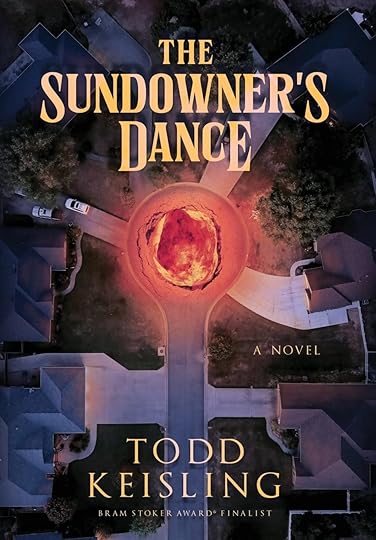The Sundowner’s Dance by Todd Keisling

[Note: This review originally appeared at FanFiAddict on February 20, 2025.]
Reeling from the loss of his wife, retiree Jerry Campbell decides it’s time for a change. The house he and Abby called home is too big and filled with too many memories. He wants to retreat and spend what little time he has left in solitude. Fairview Acres, a retirement community in the Poconos, looks like the perfect escape. But no sooner than he’s moved in does the strangeness begins. His sleep is disrupted by late, all-night parties and strange noises that sound like somebody is walking across his roof. His neighbors seem a little too invested in his life and punctuate their concerns with strange phases, like the oft-spoken “By the moon’s eye.” And then Katherine, another widower who may be suffering from dementia, appears on his doorstep warning him about the worms and insisting he leave Fairview while he still can.
Slowly but surely, the oddities begin to pile up, and author Todd Keisling does a sublime job of ratcheting up the tension and creeping paranoia that provides The Sundowner’s Dance with a pervasive sense of dread. Obviously there’s more going on in Fairview Acres than meet’s the eye. The community itself is built in the bowl of a meteor’s impact crater, with the meteor itself a prominent feature on display at the heart of Fairview. And then there’s the nightly parties and the mysterious drink the revelers consume, a concoction they refer to as a “potion.”
The Sundowner’s Dance reads like a lost episode of The Twilight Zone by way of The Prisoner, seamlessly mixing cosmic and cult horror and topping it off with a thick dose of small-town conspiracy vibes. Keisling perfectly paces the plot, slowly revealing the various aspects behind these horrors and the history of Fairview Acres in a way that keeps the pages effortlessly turning.
While those mysteries are intriguing on their own, they’d be nothing without Jerry and Katherine, and the bond that forms between them. Personally, I found a hell of a lot about both these characters to be relatable, and much of what they went through felt incredibly familiar, at times uncomfortably so. There’s a raw honesty to the way Keisling writes about depression, anxiety, and dementia that make it clear these are all topics he’s personally experienced or has otherwise impeccably researched. I know from following Keisling across various social media sites that he’s personally acquainted with depression and anxiety. I’m not sure how much he’s dealt with elder care and coping with a parent’s dementia, but I suspect based on what I’ve read here that he certainly has more than a passing familiarity.
Like Jerry and Keisling, I’ve also suffered from depression and anxiety for the bulk of my life. Although Jerry didn’t realize what he was dealing with mentally and emotionally until he was in his fifties, it wasn’t until Abby entered his life that he had a support system to help him cope and to encourage him to see a doctor and find better living through chemical assistance. So much of Jerry’s story not only rang true but mirrored so many of my own experiences and thoughts, from being an introvert seeking solitude to realizing the simple truth that I probably wouldn’t still be alive if not for my wife’s love and care. “Abby had made him feel strong and capable,” Keisling writes, “had cheered him on when the chemicals in his brain were hellbent on destroying him from the inside.” I’ve lost count of how many times my own wife has done this for me, and I can only imagine how lost I’d be without her. Keisling captures these feelings of being so lost and adrift at sea eloquently and accurately.
I lost count, too, of how many times I nodded in recognition at Keisling’s portrayal of dementia and the reactions of those left to cope with an afflicted loved one. Dementia’s a terrible, frightening ailment, and Keisling is spot-on in his description that it can steal “a personality, a soul, and left a stranger in its place,” in addition to robbing one of their dearest memories and leaving them confused, lost, paranoid, and angry. Dementia turns the person you once knew so well into a radically twisted stranger. One character recollects to Jerry about a time their dementia-addled father pulled on a gun on them, not recognizing him and convinced he was there to steal the old man’s stamp collection. Although my own father was unarmed, I couldn’t help but recall the time he was convinced I had come home to kill him and steal his silverware, and then, just as fast, mistook me for somebody else entirely. On another occasion I was peppered with questions because he thought I was his long-deceased brother, and then ranted at because he was convinced his various illnesses were the result of a conspiracy between Russia, China, and Al-Qaeda. My dad never warned me about worms, or that the moon is watching, like Katherine does, but Keisling’s handling of dementia certainly rang uncomfortably true with my own lived experiences.
Is there a more fitting topic for horror than the process of human aging? Of the tortures and transformations once must endure, or to bear witness of in others? Of the losses one accumulates across a lifetime until you’re left alone with only your grief and your memories? And that’s not even getting into the abuse and exploitation of the elderly, and how growing old and frail and ever-more reliant on others makes one a ripe target for predators and scam artists, a topic that lies at the heart of The Sundowner’s Dance. Granted, the predatory relationship here is far more Lovecraftian than the poorly worded emails from Nigerian princes offering grandma a huge inheritance if only she responds with her SSN, and at least twice as insidious.
A lot of what makes that danger work so well here is just how grounded it all is. Fairview Aces and its inhabitants feel familiar. We all know that nosey neighbor, and we’ve all dealt with the disturbances they can bring, from loud music and late-night parties to shooting off fireworks until 1:00 AM on New Year’s without a care in the world about how their actions might affect those around them. We know the greed and ego and selfishness of these types of communities and the people in them. Jerry and Katherine, they feel real, and their growing friendship is natural and naturally charming. They’re not just characters on the page, but familiar faces with stories we can relate to. The narrative is informed by so much real-world, lived-in experiences, not to mention earnest tenderheartedness, that we can’t help but go along for the ride once Keisling starts to unearth the dark, rotten underbelly at the core of this piece of Americana and expose it in the moonlight. And that moon’s eye everybody speaks of? Well, as Tom Cullen might say, M-O-O-N, that spells trouble.



